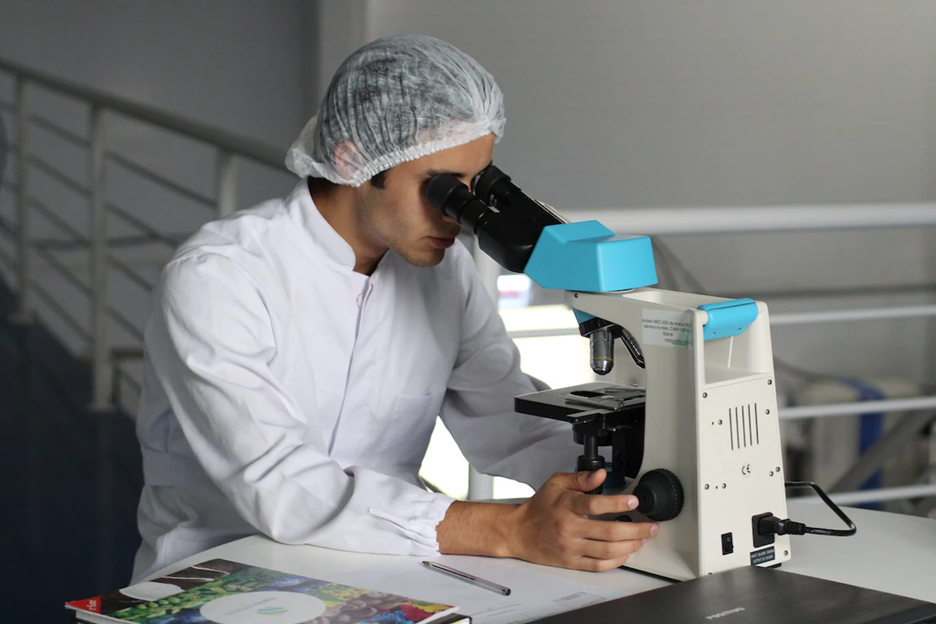Our dedication to Racial Equality and Social Justice (RESJ) spans decades. Learn more about our RESJ Initiative
Health Sciences Bachelor’s Degree
-
Credits:
120
Program Description

With Cambridge College's Health Sciences Bachelor’s Degree, you can prepare for a new career in Boston's healthcare ecosystem and learn skills that improve the health and well-being of the community. This program was developed in collaboration with local healthcare and pharmaceutical employers. It combines laboratory-based coursework with a curriculum focused on issues impacting healthcare. With 42 general education credits and 36 credits of open electives, you have the flexibility to pursue your specific career goals and interests while developing a comprehensive understanding of health sciences.
What is Health Science?
Health science is the application of science to health, including the study of medicine, nutrition, human health, health care policies, ethics, long-term care, and health care structures. You can use health science in a broad range of health careers in public health, wellness, healthcare management, the medical and pharmaceutical industries, and other fields. Health sciences graduates are highly sought after.
Positions in the health sciences range from clinical work with frequent patient contact to office work at private corporations. Because healthcare is such a diverse field, health sciences graduates have the ability to move both laterally and upward as career interests and goals change. Some of the most popular health sciences roles include health educators who teach the public about the availability of health services. They also tell communities about how to live healthier lives. Many public health nurses have a background in health sciences. These professionals often work for nonprofit organizations and government agencies to promote healthy outcomes in populations. Other health science-related roles include health services managers, biomedical equipment technicians, and clinical dieticians.
Cambridge College Health Sciences Bachelor’s Degree Highlights
The Bachelor of Science in Health Sciences degree program provides the following benefits:
- Flexible, affordable format: Complete your health sciences bachelor's degree at a reasonable cost. You can save on tuition by studying at one of the most affordable four-year private nonprofit colleges in the country. You can also choose the electives that will further your specific career goals. Talk to a Cambridge College admissions counselor about customizing your program.
- Biological science and integrative health knowledge: Develop knowledge of the processes and principles of the basic sciences, as well as advanced scientific methods. You will also analyze health policies and issues and healthcare management principles via an integrated interdisciplinary approach. That will prepare you for your future career in a healthcare-related role.
- Critical thinking and communication: Through evidence-based practice, you will think critically about healthcare concepts and learn how to solve problems in the healthcare field. You will also express your ideals and thoughts via verbal and written communication. These skills will make you more attractive to future employers.
- Real-world employment opportunities: Cambridge College is establishing partnerships with local employers to increase job opportunities for graduates from this program.
- Diversity: Cambridge College is one of the most ethnically diverse colleges in the United States. You’ll have the opportunity to work with adult learners from different backgrounds to further enhance your educational experience.
- Convenience: We offer free parking for students and our Boston campus is a quick 5-minute walk from the Orange Line, with ongoing free shuttles to/from campus.
Health Sciences Bachelor’s Degree Learning Outcomes
The health sciences BS degree program can open doors to fulfilling and lucrative job opportunities in the healthcare and pharmaceutical industries.
In addition to applying science to health, you will develop a code of professional ethics, academic integrity, and increased self-awareness. These skills will help you achieve your career goals and improve the health of people in your community. This program also teaches cultural and social understanding. You will recognize the beliefs, values, health practices, and health equity of populations and learn how to improve access to healthcare services.
What Can You Do with a Health Sciences Bachelor’s Degree?
Health sciences is a growing field. For example, the Bureau of Labor Statistics (BLS) says that the overall employment of health education specialists and community health workers will grow 12% from 2021 to 2031. That's faster than the average growth for all occupations. The BLS also reports the average salary for health education specialists is $60,600. Other health science-related roles include medical and health services managers. These positions have an average salary of $101,340.
You can also continue your studies at the graduate level with a health sciences bachelor’s degree. Cambridge College's program provides a foundation for further learning within public health, life sciences, healthcare management, and other related disciplines.
Sources:
https://www.bls.gov/ooh/community-and-social-service/health-educators.htm (visited August 2023)
https://www.bls.gov/ooh/Management/Medical-and-health-services-managers.htm (visited August 2023)
Example Health Sciences Courses
As a health sciences major at Cambridge College, you will have the opportunity to take courses such as:
- General Chemistry
- Anatomy & Physiology
- Scientific Research Coordination
- Microbiology
- Principles of Wellness & Health
- Health Care Policy and Reform
- Science of Exercise
- Epidemiology and Public Health
- Legal and Ethical Aspects of Health Care
- Scientific Research Coordination
Curriculum
Degree Completion: General education requirements may be satisfied by an associate's degree or 60 credits of prior courses that meet all general criteria for transfer; up to 90 credits may be accepted.
WRT101-102 and MAT101-102 may by waived if equivalent courses have been accepted in transfer. Credits will be replaced with open electives. WRT201 required if both WRT101-102 are waived; not required for students completing WRT101-102 at Cambridge. WRT090 and MAT100 required if assessment indicates need.
Arts & Humanities - 6 credits
Natural & Physical Sciences - 6 credits
MAT 201 Introduction to Statistics (required) - 3 credits
PHW 303 Nutrition & Health Promotion (required) - 3 credits
Social Sciences - 6 credits
This survey course serves ad a continuation and expansion of General Biology I, laying the foundation for study within the life sciences, including biology, biochemistry, biotechnology, health sciences and other specialized life science fields. This lab-based course includes an in-depth review of multicellular organisms; including the structure and evolution of plant, fungal, and animal life. Additional topics include metabolic function, biomechanics, and the interrelationships between multicellular organisms and their environments.
SCI206 serves as a continuation of Anatomy & Physiology I, and provides an in-depth study of body systems and system interactions. Topic coverage includes medical and diagnostic terminology, and an examination of the body’s anatomical and physiological systems including the respiratory endocrine, lymphatic, immune, digestive, excretory and reproductive systems. It is laboratory-based and systemic in its approach, and requires the successful completion of SCI205 or permission of instructor in order to enroll.
This course provides an historical perspective on physical activity and fitness, and how changes in lifestyle, technology and other factors that have contributed to a more sedentary lifestyle and related health concerns. Students will examine various forms of physical activity and will be introduced to exercise physiology, the ways in which physical activity impacts biology, including physical health, mental health and the brain. The literature on various forms of exercise and the impact on health will be examined including but not limited to endurance, flexibility, strength, stamina, cognition, memory. We will investigate current trends in exercise, by factors such as age, culture and gender, and whether these factors are considered in our efforts to influence rates of physical activity.
This course examines the structure of the health system, current topics in health care reform, the policy process, and advocacy for public health. Attention will be given to disparities in access to care, the quality of care, the structure of the delivery system, the challenges of long term care and the aging population, and the drivers of cost growth.
This course equips students with the essential skills and knowledge to effectively manage and coordinate scientific research projects within the field of health sciences. This course covers key principles, methodologies, and best practices involved in planning, executing, and overseeing research endeavors. Students will explore essential topics including research design and coordination, project management, collaboration, ethical considerations, data management, and communication strategies. Through practical exercises, case studies, and real-world examples, students will develop the competencies necessary to successfully navigate the complexities of scientific research coordination.
Choose electives and/or concentrations to support your academic interests and professional goals.
Core Faculty
Senior Instructor
Pages
Admissions
-
Admission Test:
No standardized graduate school tests required for admission into non-licensure programs.
-
Admissions Office:
1-800-829-4723
- Application Form:
-
Application Fee:
$50 ($100 for international students; $100 for EdD)
Health Requirements for Massachusetts Students
The Massachusetts Health Department and Cambridge College require the following of students in Massachusetts:
Immunizations – All students in Massachusetts are required to get certain immunizations before you can register for your first term. See form
Health Insurance – In Massachusetts, undergraduate students taking nine or more credits/term and graduate students taking six or more credits/term must enroll in the College’s health insurance plan. Students who have insurance with comparable coverage may request a waiver. See information and enroll or waive.
School Requirements
See Admissions Requirements for Undergraduate Programs
For the MEd in Interdisciplinary Studies, see Graduate Education Programs Admission Requirements
International Students
International students need to provide supplemental documentation:
- Official demonstration of English language proficiency
- Supplemental documentation for issuance of I-20
- International transcripts, evaluated by an accepted evaluation service
Transfer Credit
Graduate program applicants, please complete the transfer credit request form if you wish to have prior course work evaluated for transfer. Learn more about transferring credits.
Undergraduate program applicants, once you are accepted, your official transcripts are evaluated for transfer credit.
Tuition
-
Credits:
120
-
Cost per credit hour:
$502
-
Application Fee:
$50 ($100 for international students; $100 for EdD)
-
Health Insurance Fee:
$3,940 - Required for Massachusetts students only. See waiver details on Tuition & Fees page.
Note: Rates are as of June 2023, and are subject to change without notice. Rates apply to all students unless otherwise noted.
Financial Aid
Cambridge College offers financial aid to students in our degree programs who are enrolled at least half-time. Undergraduate students must be enrolled in at least 6 credits each term. Graduate and doctoral students must be enrolled in at least 4 credits each term. Learn more
Grants, Scholarships, and Loans
Cambridge College welcomes the opportunity to support your efforts to pay for college. Federal, state, and local resources in the form of grants, scholarships, loans, and work-study, including Cambridge College Scholarships, are available to help defray the cost of tuition. Learn more
Getting Your Company to Help
Many companies have tuition assistance programs, designed to help their employees with their professional development. Learn more


